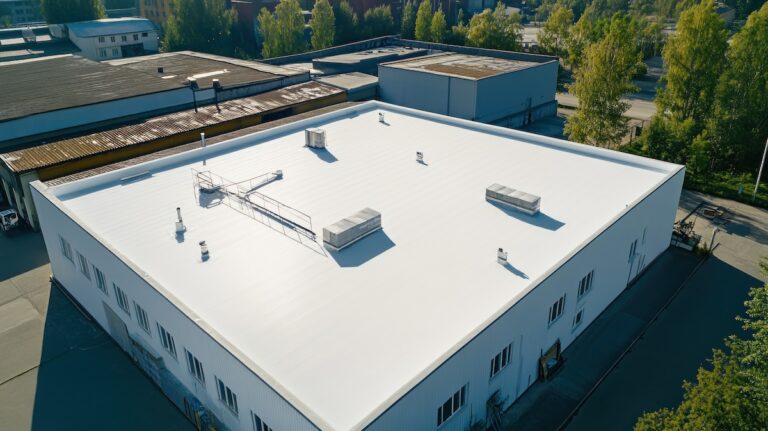When taking on a significant investment like replacing or installing a commercial roof, commercial roof financing is often a practical way to manage costs without compromising quality. For commercial property owners and managers, navigating this process involves identifying funding options, budgeting appropriately, and working with the right contractor.
If you’re planning a roofing project, here are three key takeaways to guide you through the process:
- Explore various financing options tailored to meet the specific needs of your property.
- Work with a dependable roofing partner experienced in financing and installations.
- Prioritize a long-term strategy to maximize your return on investment (ROI).
This blog will walk you through best practices for commercial roof financing to ensure your project stays on budget while maintaining quality and value.
🤔 Understand Your Commercial Roof Financing Options
The first step in financing any roofing project is understanding the different funding options available. Each option has unique benefits, so it’s essential to evaluate them against your financial goals and the long-term needs of your property.

Bank Loans or Lines of Credit
One common financing option is securing a bank loan or line of credit. Commercial property owners can use this funding to cover the upfront costs of a roofing project.
- Benefits: Access to large sums of capital for extensive projects.
- Flexible repayment terms can fit your financial strategy.
- Considerations: Securing a loan typically requires good credit and financial stability.
- Depending on the terms, interest rates can increase the total project cost over time.
Roofing Company Financing Programs
Many professional roofing companies partner with lenders to offer specialized financing programs tailored for their clients.
- Benefits: Streamlined approval process and competitive interest rates.
- Financing terms designed specifically for roofing projects.
- Considerations: It’s essential to carefully review loan terms and verify the reliability of the roofing contractor before committing.
Leasing Options for Roof Investments
Roof leasing is another option that allows you to essentially “rent” your roof over time, avoiding high upfront costs altogether.
- Benefits: Lower initial costs make it an attractive option for businesses with limited budgets.
- Regular payments can be budgeted predictably over the term of the lease.
- Considerations: Leasing typically won’t result in property ownership of the roof at the end of the term.
- Carefully assess whether leasing aligns with your financial and operational goals.
Government Incentives and Rebates
Depending on your location and the type of roofing project, government programs may offer incentives or rebates for energy-efficient installations.
- Benefits: Reduces the overall cost of your project.
- Encourages the adoption of sustainable building practices.
- Considerations: Availability and requirements vary greatly based on location and scope of the project.
💵 Create a Sustainable Budget

Effective budget planning is critical for any capital investment, and commercial roofing projects are no exception. A well-thought-out budget will ensure your project runs smoothly without unexpected financial stress.
Assess Roofing Needs and Costs
Start by evaluating the specific needs of your property to determine the scope of the project. Consider factors like:
- The size of the roof.
- Material choices (e.g., metal, TPO, EPDM).
- Additional costs like repairs, warranties, and permits.
Contact professional roofing contractors for detailed quotes to understand what pricing range to expect.
Plan for Ongoing Maintenance
When budgeting, don’t forget to account for long-term maintenance and potential repairs. Maintaining your roof is key to maximizing its lifespan and protecting your initial investment.
Incorporate Emergency Funds
Unexpected issues, such as weather delays or underlying structural damage, can increase costs during a project. Set aside a contingency fund to handle surprise expenses without derailing your budget.
👍 Work with the Right Roofing Partner
Your choice of roofing contractor can significantly influence the success of your financing process and the final project outcome. A trusted, experienced partner will help you make informed decisions and deliver quality workmanship within your budget.

Key Qualities of a Trusted Roofing Contractor
When selecting a roofing contractor, prioritize these attributes:
- Experience with commercial roofing and knowledge of financing options.
- A strong track record with references and case studies.
- Being fully licensed and insured to ensure you’re protected from legal and financial liabilities.
Why Partnering with a Financing-Savvy Roofer Matters
Contractors familiar with commercial roof financing can guide you through funding arrangements and tailor solutions that align with your needs. They often have established relationships with lenders, making the financing approval process simpler and more efficient.
Questions to Ask Before Hiring
To make the most informed choice, ask potential contractors the following questions:
- Do you offer financing options or work with preferred lenders?
- Can you provide examples of similar projects you’ve completed successfully?
- Are there energy-efficient upgrades or incentives you recommend for maximum ROI?
✅ Best Practices for a Commercial Roof Financing Plan
Optimal financing doesn’t just mean securing the money you need today; it’s about setting the stage for long-term financial and operational success. Follow these steps to craft a strategic financing plan.
1. Assess Long-Term Value
Think beyond the initial cost of the roof. A durable, energy-efficient investment may cost more upfront but will save money over time through reduced maintenance, lower utility costs, and extended lifespan.
2. Get a Professional Roof Inspection
Before committing to a financing plan, hire a professional to conduct a detailed inspection. The results can help avoid surprise repairs and ensure your budget covers all project aspects.
3. Compare Interest Rates
Shop around for competitive financing offers from multiple lenders. Look for plans with lower interest rates and manageable payment schedules that fit your cash flow.
4. Choose Materials Wisely

Invest in materials known for their durability and energy efficiency. Although premium materials may cost slightly more, the long-term savings from reduced energy and maintenance costs will outweigh the initial expense.
5. Consult with a Financial Advisor
Consulting with a financial advisor or accountant can provide clarity on your financing options and identify tax benefits for energy-efficient upgrades.
6. Monitor and Optimize Your Plan
Once your project begins, closely monitor spending and progress to identify opportunities for cost optimization. Be proactive about addressing any potential issues before they become budgetary problems.
Why Trust G. Cannon for Your Commercial Roofing Needs?
At G. Cannon, we’re more than just experts in commercial roofing, we’re your partners in protecting your property and investments.
Whether it’s selecting the right materials or ensuring flawless execution, our team is here to help your business thrive.
Take the First Step Today! Contact G. Cannon today for a free estimate on your roofing project. Together, we’ll create a customized plan that meets your budget and secures the long-lasting performance your commercial property deserves.






